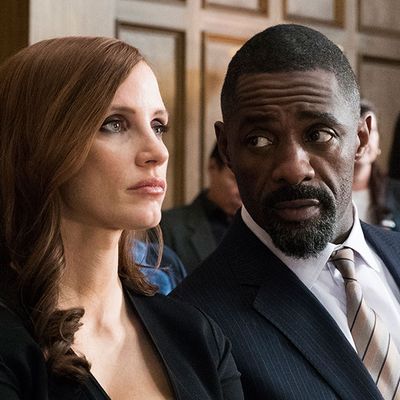
Aaron Sorkin makes his feature-film directorial debut with Molly’s Game, based on the memoir of a super-high-stakes poker impresario named Molly Bloom. Don’t expect lengthy, searching pauses for Sorkin’s camera to explore the milieu. He doesn’t trust pauses — he’s probably afraid he’ll lose us if he takes his foot off the gas. So the movie is narrated to within an inch of its life. Molly (Jessica Chastain) chatters away on the soundtrack, pausing only to chatter away in the flesh. It’s excellent chatter, though. Sorkin puts you in a mood to hear actors talk very fast, and Chastain and Idris Elba (as her straight-arrow lawyer) are virtuoso very-fast talkers—they sound as if the words whizzing out of their mouths are coming from their heads. Sorkin is often lampooned for his walking-and-talking shtick, but what he’s best at is depicting racing minds.
Molly’s Game has two, winding temporal strands. The first is a series of meetings with the lawyer after she’s arrested by the FBI in a humiliating predawn raid. To persuade him to represent her, she tells him the story of her life — the movie’s second strand. A potential Olympic skier, she fell from grace (figuratively and literally) with her demanding psychologist father (Kevin Costner) when a frozen twig ended her sports career with a ghastly crunch. Unable to compete in her dad’s eyes with her two accomplished brothers, she found in the poker game the quickest route to the company of powerful men in finance and show business—men who’ll bet ungodly amounts of money the instant they sit down.
Those men are a colorful bunch, and Molly fills us in on who they are and how they like to play, their cards arrayed on the screen for easy comprehension. Michael Cera dominates the first part of the film as a hotshot actor based on Tobey Maguire, among the most scarily dislikable of the memoir’s characters. (“I don’t like playing poker,” he tells Molly. “I like destroying lives.”) Molly is hilarious on “Bad Brad” (Brian d’Arcy James), a hedge-fund manager who seems serenely untroubled by his own ineptitude, along with sundry trust-funders who plead poverty when they can’t pay back the house. The most wrenching sequence centers on Harlan (the superb Bill Camp), who plays with emotional detachment — until the night he’s rattled by a fluke and turns pathetically reckless.
The emotional core of Molly’s Game — what makes the lawyer passionate in her defense — is that she doesn’t want anyone to get hurt. She won’t send “muscle” to call in debts. She won’t turn over emails that would get her off the hook with the FBI but incriminate others. The lawyer’s daughter is conveniently reading Arthur Miller’s The Crucible, and Molly draws on John Proctor’s declaration that his name is all he has and he will not sully it.
To buy Molly’s Game, you have to buy that a person can be in an ugly business — a business that rests on taking advantage of people’s avarice and weakness — and maintain a core of decency. Molly might wear short, low-cut dresses to please her clientele and make sure to listen to the tales of woe, but she won’t abuse her power. She will take her clients’ money, but she won’t victimize them. To the lawyer’s daughter, she’s a fine role model in an imperfect capitalist world.
God help me, I did choose to buy it. The only thing I didn’t buy is Molly’s apparent lack of a romantic life, as if she’s somehow keeping herself “pure” for the game. Either way, Chastain is terrific. The role points up the tension in her between hard and soft, between self-protective frostiness and an empathy that can’t be suppressed. (As the teenage Molly, Samantha Isler matches up beautifully with her.) Everything clicks in Chastain’s scenes with Elba, who leans into her as if trying to discern if she’s for real under the mask — the performance building to a climactic peroration to prosecutors that got a hand from the preview audience. Sorkin leaves nothing for us to discover on our own — he controls every response. But if he’s not yet a true film artist, he’s one hell of a cardplayer.


